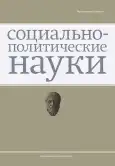Определяющая роль наследия ГДР в немецком самосознании
- Авторы: Заводнюк П.Д.1, Чулаби Д.Г.1, Богданова Н.В.1
-
Учреждения:
- Санкт-Петербургский политехнический университет Петра Великого (СПбПУ)
- Выпуск: Том 13, № 3 (2023)
- Страницы: 133-137
- Раздел: Международные отношения, глобальные и региональные исследования
- URL: https://journal-vniispk.ru/2223-0092/article/view/145559
- DOI: https://doi.org/10.33693/2223-0092-2023-13-3-133-137
- EDN: https://elibrary.ru/EBPAMG
- ID: 145559
Цитировать
Аннотация
Цель исследования. В данной статье анализируется роль наследия ГДР в немецком самосознании после объединения Германии. На задачу, заключающейся в восстановлении немецкой политической идентичности и самосознании граждан, повлиял, в первую очередь, опыт преобразования бывшего государства ГДР, который выражался в демократизации территории через объединение и воссоединение с Западной Германией в 1990 г. В результате проведенных исследований авторы пришли к выводу, что особенности самоидентификации восточногерманского самосознания могут проистекать из двойного исторического опыта, который выражается в опыте и сохраненной памяти о жизни при активно насаждающейся идеологии социализма и продолжающемся опыте жизни с уже объединенной, но отчасти все такой же чуждой ФРГ.
Выводы. Авторы выделяют два проявления самобытной восточногерманской идентичности: социализм «третьего пути», который появился в результате мирных преобразований 1989 г., а также «Остальгия», подразумевающая собой ностальгию по прошлой жизни в Восточной Германии. Данные два феномена обладают наибольшим потенциалом для того, чтобы и в дальнейшем оставаться в качестве наследия ГДР и наглядной демонстрации сохраняющейся обособленности в самосознании жителей Восточной части современной объединенной Германии.
Ключевые слова
Полный текст
Открыть статью на сайте журналаОб авторах
Полина Дмитриевна Заводнюк
Санкт-Петербургский политехнический университет Петра Великого (СПбПУ)
Автор, ответственный за переписку.
Email: zavodnyuk478@gmail.com
студентка Высшей школы международных отношений Гуманитарного института
Россия, Санкт-ПетербургДарья Горбан Чулаби
Санкт-Петербургский политехнический университет Петра Великого (СПбПУ)
Email: dashajjchoulabi@gmail.com
студентка Высшей школы международных отношений Гуманитарного института
Россия, Санкт-ПетербургНадежда Викторовна Богданова
Санкт-Петербургский политехнический университет Петра Великого (СПбПУ)
Email: nvbogdanova.imop@mail.ru
SPIN-код: 8701-6177
кандидат педагогических наук, доцент Высшей школы международных отношений Гуманитарного института
Россия, Санкт-ПетербургСписок литературы
- Нефедов В.В. Гуманитарный фактор и культура в ГДР // Преподаватель XXI век. 2011. № 3–2. С. 261–266.
- Le Gloannec A.-M. On German identity // Daedalus 123. 1994. No. 1. Pp. 129–148.
- Волгина Е.В. Проблема объединения Германии в 1990 году // Форум молодых ученых. 2018. № 4 (20). С. 294–297.
- Шаншиева Л.Н. От ГДР к восточным федеральным землям Германии: особенности экономической и политической трансформации (1989–2019 гг.) // Трансформационные революции в странах Центральной и Юго-Восточной Европы. К 30-летию событий 1989–2019. СПб.: Нестор-История, 2021. С. 89–101.
- Хорольская М.В. Германия после объединения: политические проблемы и противоречия интеграционного процесса: дис. ... канд. полит. наук (специальность 23.00.02). М., 2019. 22 с.
- Филитов А.М. Национальный вопрос в послевоенной Германии // Преподаватель XXI век. 2016. № 4–2. С. 428–440.
- Рожнов Р.Д. Проблема сохранения монументального наследия ГДР после объединения Германии // Язык. Культура. Перевод. Коммуникация: сб. науч. тр. Вып. 4. М.: Издат. дом КДУ, 2023. С. 276–279.
- Бардин Г.Е. Влияние остальгии и существования ГДР на политическую и социальную повестку ФРГ // История и современное мировоззрение. 2022. № 2. С. 132–139. URL: https://cyberleninka.ru/article/n/vliyanie-ostalgii-i-suschestvovaniya- gdr-na-politicheskuyu-i-sotsialnuyu-povestku-frg (дата обращения: 09.04.2023).
- Федорова О.О. Феномен германской «остальгии» // Молодой ученый. 2010. № 10. С. 231–233.
- Жукова А.А., Пятунина А.А. Остальгия. Тоска по ГДР // Профессионально-личностное развитие студента в иноязычной образовательной среде: сб. ст. по матер. студ. науч. семинаров, Москва, 19–23 октября 2020 г. / под ред. О.В. Павленко. М.: Российский государственный гуманитарный университет, 2021. С. 397–409.
- Дробот Н. Остальгия как особое художественное направление в современном изобразительном искусстве // Философические письма: русско-европейский диалог. 2018. Т. 1. № 2. С. 112–133.
Дополнительные файлы








